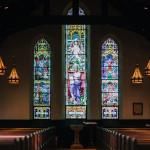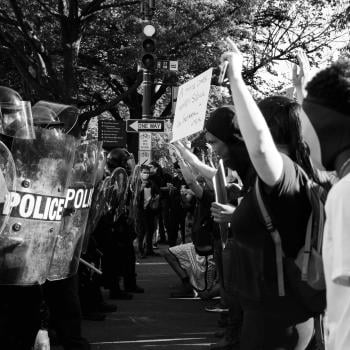
Why I Needed Church, and Why I Don’t Anymore
When I decided to step down as a pastor, there was a simultaneous stepping away from the church institution. The sacred space of church evaporated. It no longer made sense to talk to a God located outside of my own soul, to which the sermons and music so often alluded. I didn’t feel separated from God, so the cries for “His Presence” felt distinctly hollow. I no longer needed the altar, communion, worship music, or a preacher. Hell! I no longer needed to preach! Why? Because projections of shadow and Self were no longer necessary. I encountered my shadow, and begun building a relationship with it. In the case of my last church experience, I no longer needed a community that was unaware of its shadow, and that didn’t have avenues for reclaiming its projections.
So, I don’t go to church anymore. This stems back to my stint as an associate pastor and my concurrent experience in Deep Water, an organization specializing in holding retreat space for men to plunge into the “inner waters,” and befriend the scary shit they discover about themselves. Deep Water offered tools, language, experiences, and community for navigating the vast inner ocean. My church; however, protected people from their inner-depths, by employing spiritual water-treading rooted in clichéd and persona-restoring techniques.
My church actually had an official tagline, “Together we will get there.” If Deep Water had a tagline, it would be “Individually, we are here together.” Words matter, and if we compare these taglines, we can see the gap, and perhaps why I was so disillusioned. Perhaps these resonate with your church experience.
- Togetherness versus Individuality: This is not a binary, but rather two opposites to hold in tension. My church believed that togetherness would help the individual feel connected and less isolated. However, Deep Water intuitively knew if we guided individuals to their own center, their hidden self, they’d regain connection with themselves, as well as other people: their partners, children, friends, life purpose etc.
- We will vs. We are: My church seemed hell-bent on some future destination, just around the bend. Deep Water centered on the present realities of life, and gave retreatants safe, sustainable, yet challenging opportunities to encounter them. My church sought to skim over the present in hopes of a better tomorrow. Deep Water held that participants’ reality was their invitation into the present, and would ultimately shape their direction of life.
- There vs. Here: My church, and others like it, thrive off psychological projection–followers are led to experience out “there” what is actually taking place within “here.” Carl Jung held that whatever we deny about ourselves, moves into the shadow, and then appears most often in the form of projections onto other people, institutions, and even our image of the Divine. Projections are essential to discovering our shadowed self, but they become harmful when we do not reclaim our projections. Because my church was unconscious of this process, there was no avenue for reclaiming such projections. The entire community structure was in many ways founded on a perpetual exchange of unconscious mutual projections.
- The greeter projected her inner stranger onto a first-time visitor. The first time visitor projected his sense of belonging on the greeter, and the heightened presentation of hospitality.
- The volunteer staff projected their needs onto congregants, and the congregants projected their agency and autonomy onto the staff.
- The congregation projected its sexuality onto the worship team/experience (I’m using sexuality broadly to refer to everything from erotic experience, to intimacy with the Divine, and even human creativity). I don’t necessarily mean that each individual did this, but rather the collective unconsciousness of the group projected the inner image of intimacy, sexuality, romanticism, and embodied emotional expression onto the individuals and unfolding drama of the staged worship set.
- Many churches project their image of God onto the pastor, especially if the pastor is male, and holds a strong, self-assured, patriarchal personality (you can read more about this in the book Inner Gold: Understanding Psychological Projection, and/or Meeting the Shadow on the Spiritual Path). I suspect there was some of this in my church, but more likely I believe we used the senior pastor as a mechanism to conceal our collective shadow. Our pastor was incredibly warm, agreeable, generous, and never showed anger. He talked often about his strength of harmony, which is partially why our tagline highlighted “togetherness.” However, our harmonious facade hid our high attrition rate, boiling staff tension, lack of clear work boundaries, and the gaslighting of queer and BIPOC individuals who attempted to address systemic homophobia and racism.
Religion’s Function
Though I’m not attached to a religious group, I still have need for the essential elements religion offers, and what Jung calls the religious function. Religion, from the Latin religare meaning “to bind, or bring together” functions to connect people to the Transcendent, the Divine. But this isn’t often the case in our experience. Jungian analyst, Edward Edinger writes,
“Religion is the best collective protection available against both inflation and alienation […] However, although [Religion] protects [humans] from the dangers of the psychic depths, it also deprives them of the individual experiences of these depths and the possibility of development which such experiences promote.” (Ego and Archetype, pg. 64).
Inflation & Alienation
Religious institutions protect people against inflation, where the individual ego overestimates its sphere of influence, control, and importance in relation to Self (the Jungian term for how we may think of God, the Divine, etc.). By continuing to point to a God up there, individuals, in theory, never get too big. Likewise, religion protects against alienation, where individuals become disconnected and disoriented from the Self. Religion provides agreed-upon God-images, and common practices, which hedges congregants from too much separation and disillusionment.
Seasons of alienation and inflation are necessary for individuation (the term Jung used to refer to the life-process of wholeness and integration). Alienation is dark, painful, and can be depressive, but it is essential for detaching from the old, and integrating the new. Many religious institutions thrive off keeping people stuck in a constant state of low-grade alienation. Contemporary Evangelicalism dangles God’s approval just out of reach, so there is always more one can do; always a better image one can aspire to reach.
Inflation on the other hand, is often exhilarating, highly energizing, and intoxicating. Many people I know (myself included) grew up in religious communities that defended intensely against inflation. The result? People only know God’s will, and never discover their own. They abdicate their agency, and fill it with a highly controlling God-image that guides their every step. And instead of building a healthy attachment with the Divine, they settle for codependency, and anxiously scan for God’s presence and approval.
Cultivating a Healthy Ego-Self Axis
The below diagram displays how Edinger conceptualizes the ego-Self relationship. Religion’s facilitation of this relationship is symbolized in the diagram by the straight line connecting the center of the ego to the center of the Self.

On the far left side is an image of inflation–the ego and Self are experienced as identical, just as a newborn is undifferentiated from its primary caretaker. Here, there is no real relationship, only sameness–togetherness without differentiation. The far right image represents ego alienation where the individual ego is cut off from the life sustaining and animating power of the Self.
Individuation, the development of the ego-Self axis is cyclical, not linear. Ego inflation and ego alienation are natural processes and seasons one moves through many times through the individuation journey. To be human is to experience both. When it is healthy, religion provides the container for this process by tethering us to the ground during inflation and offering buoyancy so we don’t sink during alienation.
Christianity, for example, calls the individual ego to take up its cross, die, and follow Christ (Christ is an image of the Self). The ego’s death is not annihilating, but approximating. The cross does not destroy the ego, but separates it from the Self, so that it can be in relationship with the Self. The archetypal brilliance of the cross symbol it that it cultivates and maintains the ego-self axis by exalting the humble, and humbling the exalted (Matthew 23:12).
What we need and what we don’t
Robert Moore writes this in his book, The Archetype of Initiation, “Most forms of Christian spirituality deny the shadow. […]” In Jungian terms we would say that Christian worship has become persona-restoring and not a place for the personal or congregational shadow to return to be confronted and wrestled with in an intense and committed way.” (148). Good religion creates pathways of connection with shadow, and the greater unconscious, without becoming overwhelmed by it.
- We don’t need religion, but we need protection from too much inflation and alienation. That is, we need some way for our ego to stay connected to the Self.
- We don’t need a church, but we need sacred space; space that strips the ego, so it can encounter the Self.
- We don’t need a preacher, but we need words and symbols that contain transformative power.
- We don’t need a worship experience, but we need spaces that allow us to enter and exit mystical, transcendent experiences.
- We don’t need an agreed upon God-image, but we need images that allow us to microdose the unconscious into our conscious life.
- We don’t need doctrine, but we need boundaries and beliefs that hold our lived experience.
- We don’t need the bible, but we need stories that contain universal symbols and ancient wisdom. Without such stories we risk our ego becoming too big or too small.
- We don’t need God, but we need the animating, life-sustaining energy from which our God image is rooted.
Religion isn’t going anywhere, but that doesn’t mean you need to be a part of it. It holds an essential place in the collective consciousness, but you may come to a point where you simply have outgrown it. However, we need connection with the Self, which allows us to integrate parts of our humanity we otherwise don’t have access to.
If you’d like more language, tools, and companionship in this journey, register for my upcoming course, Companioning Our Shadow: Befriending Emotions, Healing Relationships.













